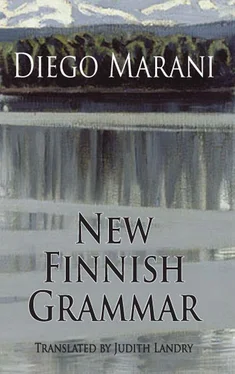Viipuri, 12 April 1944
Dear Sampo,
This is the first peaceful afternoon I’ve had since we arrived, and I am taking advantage of it to write this letter. We’ve been having a hard time of it. Our arrival in Viipuri was eventful, to say the least. It took us several days to set the refugee centre to rights — everything was in a state of utter neglect. The hospital is short of everything, including staff. We are expecting a delivery of medical equipment, but we also need blankets and camp beds, and fuel and goodness knows what else. We’re in a permanent state of alarm; we’re not far from the front, and those in the know say that there could be a Russian attack. Plans have already been made to evacuate the place, if necessary. Several families of peasants who’d been evacuated came back with the thaw; they’ve moved back into their farms, which they had abandoned after the Winter War, and they refuse to leave them yet again. They won’t even come to collect their rations, they’re so frightened of being kept here in the refugee centre. They say that the Russians have no reason to attack, that Viipuri is no concern of theirs. Some days ago we saw the last German divisions retreating, walking down streets between silent crowds. Apparently the Germans are now drawn up at Uhtua. Anyway, too far away from here to alarm the Russians. The second regiment of coastal artillery arrived at Viipuri yesterday, on its way through. The soldiers camped near the hospital; they were singing the Porilaisten marssi . And so I thought of you. I am taking the liberty of addressing you in the familiar form, because otherwise I couldn’t speak as frankly as I would like. I behaved stupidly that night we met at the Kämp. War does strange things to time, it distorts reality. In war, everything seems temporary, transient. Perhaps that’s why I felt the need to say things to you that I would have kept for a later stage of our friendship, had there been one. I was selfish — thinking only of myself. I’d only just told you my name, and already I was going all out, telling you about my silly adolescent games. It’s partly to do with the fact that I’m a Red Cross Nurse, I just take it too far. I simply can’t stop wanting to be of help. You know, something struck me the very day that you arrived, that January morning when I showed you to your bed in the visitors’ quarters: the fear in your eyes. It wasn’t the fear that I was used to seeing, the sort you see in the eyes of soldiers who are mortally wounded, or of the father who has lost his son. It was a fear beyond all reason, not rooted in this world. I still remember how you looked at me, seated on your bed, when I turned to look back at you as I walked down the corridor. I felt your pain and I wanted to be of help — another example of my urge to help others, cost what it may. That’s why I went to see Koskela, to ask him to keep an eye on you. When I saw you at the Kämp, I felt reassured. I thought that you seemed better, that you had settled in, found your place among us. But I hadn’t yet seen your eyes. The moment I got closer, I saw that that same fear was still there, as strong as ever. Then I was impertinent enough to think that perhaps some gesture of affection might break through that paralysing shell of pain. I hadn’t yet understood that yours was a different kind of suffering. I’ve been thinking about it these last few days. It must be terrible not to have a past, not to remember your own childhood; and even worse not to be able to share this suffering with someone else. Because no one has ever come back from the place you’ve fallen headlong into. For me, my childhood is an old photo I always carry with me, just a close-up of when I was a gap-toothed ten-year-old little girl. But the dress I’m wearing in that faded old photograph, the rather hazy background with our big old country house, they are a mine of memories which leap out to greet me every time I look at it. I understand how painful such a lack of memories must be, how awful it must be to have nothing but emptiness behind you. But perhaps it is a mistake to keep on searching for a past which has now completely disappeared. After all, the past is in fact the only wound which always heals — indeed, it does so on its own, without any help from us. Is this compulsion to seek out traces of your past self really so strong? Would it not be more helpful to work patiently at filling in real time — that time which is left to you — building up a new memory for yourself brick by brick, as one might put it? An interfering friend might help to distract you from this obsessive search for something which has gone. Please write to me. Tell me how you spend your days. Tell me about Koskela’s sermons. Does he still get so wound up? Tell me about Helsinki, now that spring is here. Has the new grass started coming up? Is the Esplanadi coming into leaf? Next month, the berries will be ripening in the woods. If they give me permission to come back, we’ll go and gather them together.
Love,
Ilma
I had found this letter on my bed, when I went back to the dormitory to collect my notebook for my lesson with the pastor. It was the first time I’d seen my name on an envelope. It looked good, written there in black ink; so good that I almost didn’t want to open it. I did not immediately understand all that I read. I rushed excitedly from one line to another, looking for words I knew and skipping those I felt I would be able to decipher later. Sometimes a few letters were enough to tell me all I needed to know about a verb and then a whole line would dance before me, the words opening out one after another, letting the meaning shine through. But often whole sentences remained unclear, clouded by very little words, like so many padlocks obstructing the flow of meaning. I read all that I could, then I curled up on the bed, holding the unfolded sheet of paper firmly in my hand. Weak sunlight fell through the window, slithering across the floors right up to the beds. The room was flooded with perfect silence, like still water, through which my body was slowly surfacing. Those words were bringing every part of me to life, enlarging me through their magnifying lens. Ilma had called out to my grief, had given it a name, and it was answering her call.
‘I was expecting you. Are you not feeling well?’
It was Koskela; he was standing in the doorway.
‘No, I’m fine, I’d just dozed off. I’m all yours.’
I got off the bed, picked up the notebook and straightened the blanket. The pastor pretended not to notice as I stuffed the letter into the pocket of my jacket. Then, without asking for any explanation, he answered the questions I put to him about the bits I had not understood, copied down into my notebook.
‘Today we’ll have our lesson in the open air. I want to show you something,’ he said, striding off with his hands in his pockets. We went out into the road, came to the Suurtori and went down to the wharf at Katajanokka. The day was mild and colourless; a pearly light fell from the white sky, casting no shadows.
‘There’s something you need to understand: the frontier on which this war is being fought does not just divide two peoples, us and the Russians. It also separates two different souls. Sister souls, it’s true, but tragically at odds on one essential point: the idea of the world to come. And for man, a mortal creature who lives a fleeting life upon this earth, the world to come is all-important.’
We had crossed the Katajanokka Canal in front of the presidential palace. Now we were climbing the hill on which the Uspenski Orthodox Cathedral stands. I tried to keep up with the pastor as he climbed the steep slope, the better to understand his words.
‘That’s typical of the Russians,’ he said, stopping at the main door. Luckily he was out of breath, and this forced him to speak more slowly.
Читать дальше












